In the Sport and TMA...Again thread, (man that thread gets a lot of attention

) Chris and Steve were having an interesting debate and something that was said, caught my eye.
Steve said:
To which Chris replied:
So, what does everyone think? Can you become an expert or authority on SD, with no real world experience? Sure, of course, one of the most effective tools of SD is avoidance. Is there something you can potentially do to avoid a situation? If you can avoid something altogether, you're better off. Of course, in the perfect world, sometimes things aren't that easy, so physical skills are necessary. But having experience in hands on skill, I feel is important. Would you want to go in for surgery and know that you will be the first patient that this new doctor has ever worked on? How about the pilot flying the plane you're on? I'd like to know that my flight isn't this guys first solo flight. LOL.
I'd like to think that if we took 2 people, 1 with no experience at all, and then someone like Rory Miller, that it should be a no brainer.

